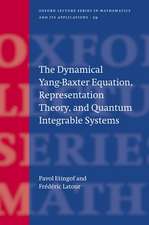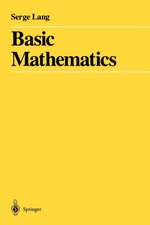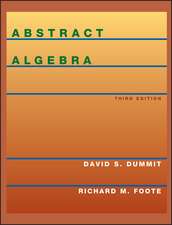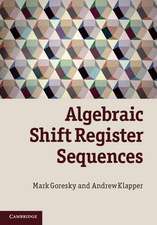Representations of the Infinite Symmetric Group: Cambridge Studies in Advanced Mathematics, cartea 160
Autor Alexei Borodin, Grigori Olshanskien Limba Engleză Hardback – 26 oct 2016
Din seria Cambridge Studies in Advanced Mathematics
-
 Preț: 464.60 lei
Preț: 464.60 lei - 8%
 Preț: 425.80 lei
Preț: 425.80 lei - 8%
 Preț: 462.95 lei
Preț: 462.95 lei - 8%
 Preț: 427.88 lei
Preț: 427.88 lei - 8%
 Preț: 432.11 lei
Preț: 432.11 lei -
 Preț: 393.71 lei
Preț: 393.71 lei - 8%
 Preț: 553.27 lei
Preț: 553.27 lei -
 Preț: 386.79 lei
Preț: 386.79 lei - 11%
 Preț: 467.12 lei
Preț: 467.12 lei - 9%
 Preț: 614.66 lei
Preț: 614.66 lei - 11%
 Preț: 530.52 lei
Preț: 530.52 lei -
 Preț: 312.62 lei
Preț: 312.62 lei - 8%
 Preț: 453.00 lei
Preț: 453.00 lei - 8%
 Preț: 464.42 lei
Preț: 464.42 lei - 8%
 Preț: 432.71 lei
Preț: 432.71 lei - 8%
 Preț: 392.03 lei
Preț: 392.03 lei - 8%
 Preț: 498.30 lei
Preț: 498.30 lei -
 Preț: 388.70 lei
Preț: 388.70 lei - 8%
 Preț: 498.91 lei
Preț: 498.91 lei -
 Preț: 390.84 lei
Preț: 390.84 lei -
 Preț: 406.02 lei
Preț: 406.02 lei - 8%
 Preț: 452.91 lei
Preț: 452.91 lei -
 Preț: 408.46 lei
Preț: 408.46 lei - 11%
 Preț: 507.53 lei
Preț: 507.53 lei - 11%
 Preț: 701.48 lei
Preț: 701.48 lei - 9%
 Preț: 724.21 lei
Preț: 724.21 lei - 11%
 Preț: 666.20 lei
Preț: 666.20 lei - 9%
 Preț: 713.76 lei
Preț: 713.76 lei - 11%
 Preț: 509.01 lei
Preț: 509.01 lei -
 Preț: 441.20 lei
Preț: 441.20 lei -
 Preț: 380.60 lei
Preț: 380.60 lei - 11%
 Preț: 574.99 lei
Preț: 574.99 lei - 11%
 Preț: 584.52 lei
Preț: 584.52 lei - 11%
 Preț: 620.70 lei
Preț: 620.70 lei -
 Preț: 475.97 lei
Preț: 475.97 lei - 14%
 Preț: 722.74 lei
Preț: 722.74 lei - 11%
 Preț: 635.44 lei
Preț: 635.44 lei - 14%
 Preț: 693.21 lei
Preț: 693.21 lei - 11%
 Preț: 670.13 lei
Preț: 670.13 lei -
 Preț: 393.05 lei
Preț: 393.05 lei - 11%
 Preț: 680.05 lei
Preț: 680.05 lei - 11%
 Preț: 668.13 lei
Preț: 668.13 lei -
 Preț: 301.84 lei
Preț: 301.84 lei - 11%
 Preț: 619.10 lei
Preț: 619.10 lei
Preț: 442.71 lei
Preț vechi: 497.43 lei
-11% Nou
Puncte Express: 664
Preț estimativ în valută:
84.71€ • 87.40$ • 70.69£
84.71€ • 87.40$ • 70.69£
Carte tipărită la comandă
Livrare economică 26 martie-09 aprilie
Preluare comenzi: 021 569.72.76
Specificații
ISBN-13: 9781107175556
ISBN-10: 1107175550
Pagini: 168
Ilustrații: 2 b/w illus. 80 exercises
Dimensiuni: 157 x 235 x 15 mm
Greutate: 0.37 kg
Editura: Cambridge University Press
Colecția Cambridge University Press
Seria Cambridge Studies in Advanced Mathematics
Locul publicării:New York, United States
ISBN-10: 1107175550
Pagini: 168
Ilustrații: 2 b/w illus. 80 exercises
Dimensiuni: 157 x 235 x 15 mm
Greutate: 0.37 kg
Editura: Cambridge University Press
Colecția Cambridge University Press
Seria Cambridge Studies in Advanced Mathematics
Locul publicării:New York, United States
Cuprins
Introduction; Part I. Symmetric Functions and Thoma's Theorem: 1. Preliminary facts from representation theory of finite symmetric groups; 2. Theory of symmetric functions; 3. Coherent systems on the Young graph; 4. Extreme characters and Thoma's Theorem; 5. A toy model (the Pascal Graph) and de Finetti's Theorem; 6. Asymptotics of relative dimension in the Young graph; 7. Boundaries and Gibbs measures on paths; Part II. Unitary Representations: 8. Preliminaries and Gelfand pairs; 9. Classification of general spherical type representations; 10. Realization of irreducible spherical representations of (S(∞) × S(∞), diagS(∞)); 11. Generalized regular representations Tz; 12. Disjointness of representations Tz; References; Index.
Recenzii
'… the aim of this book is to provide a detailed introduction to the representation theory of S(∞) in such a way that would be accessible to graduate and advanced undergraduate students. At the end of each section of the book, there are exercises and notes which are helpful for students who choose the book for the course.' Mohammad-Reza Darafsheh, Zentralblatt MATH
'This book by A. Borodin and G. Olshanski is devoted to the representation theory of the infinite symmetric group, which is the inductive limit of the finite symmetric groups and is in a sense the simplest example of an infinite-dimensional group. … This book is the first work on the subject in the format of a conventional book, making the representation theory accessible to graduate students and undergraduates with a solid mathematical background. The book is very well written, with clean and clear exposition, and has a nice collection of exercises to help the engaged reader absorb the material. It does not assume a lot of background material, just some familiarity with the representation theory of finite groups, basic probability theory and certain results from functional analysis. … Among the many useful features of the book are its comprehensive list of references and notes after every section that direct the reader to the relevant literature to further explore the topics discussed.' Sevak Mkrtchyan, Mathematical Reviews
'This book by A. Borodin and G. Olshanski is devoted to the representation theory of the infinite symmetric group, which is the inductive limit of the finite symmetric groups and is in a sense the simplest example of an infinite-dimensional group. … This book is the first work on the subject in the format of a conventional book, making the representation theory accessible to graduate students and undergraduates with a solid mathematical background. The book is very well written, with clean and clear exposition, and has a nice collection of exercises to help the engaged reader absorb the material. It does not assume a lot of background material, just some familiarity with the representation theory of finite groups, basic probability theory and certain results from functional analysis. … Among the many useful features of the book are its comprehensive list of references and notes after every section that direct the reader to the relevant literature to further explore the topics discussed.' Sevak Mkrtchyan, Mathematical Reviews
Notă biografică
Descriere
An introduction to the modern representation theory of big groups, exploring its connections to probability and algebraic combinatorics.
















